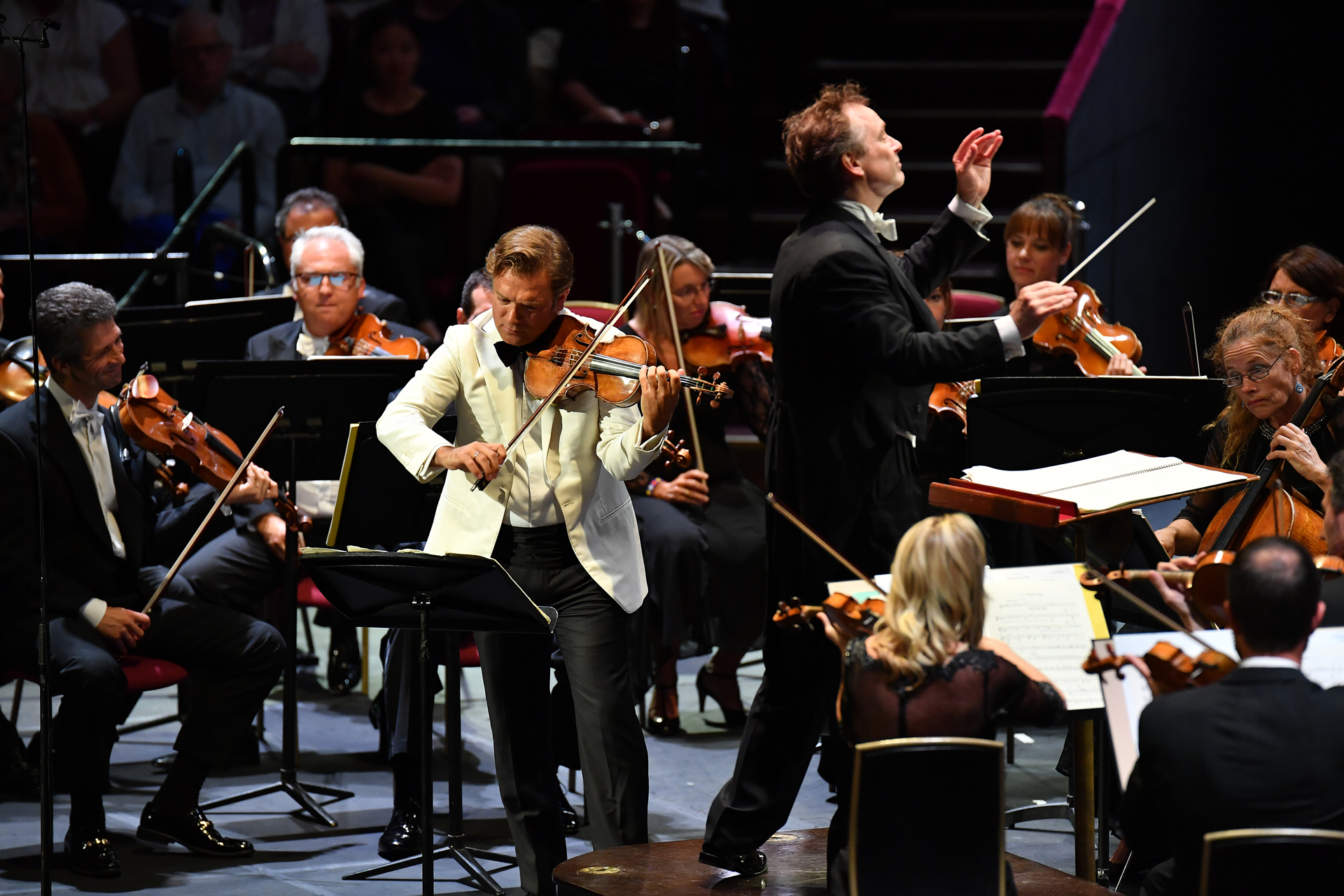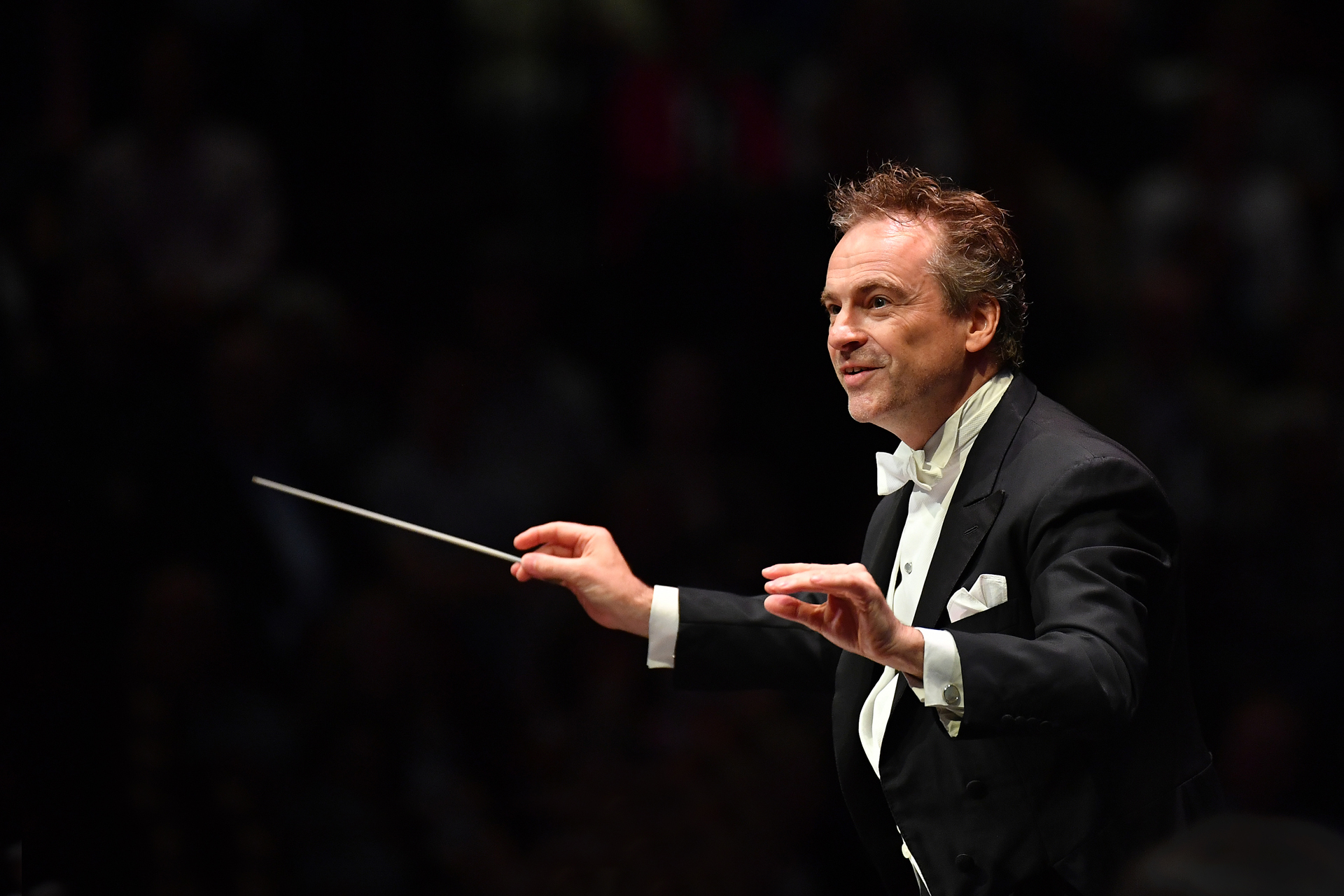Prom 45, Capuçon, Orchestre de la Suisse Romande, Nott - scintillating new era for Swiss magicians | reviews, news & interviews
Prom 45, Capuçon, Orchestre de la Suisse Romande, Nott - scintillating new era for Swiss magicians
Prom 45, Capuçon, Orchestre de la Suisse Romande, Nott - scintillating new era for Swiss magicians
Top British artistic director in Geneva gives us the Ansermet tradition plus
Who is the greatest British conductor in charge of a major orchestra? It's subjective, but my answer is not what you might expect. Jonathan Nott has done all his major work so far on the continent.
Does anything remain of that French-Swiss timbre which still comes across so distinctively on Ansermet's 314 Decca recordings with the orchestra (a further 624 broadcasts are lodged in the Suisse Romande archive, awaiting further dissemination)? Possibly in the bright, cutting-edge brass and the supple wiriness of the strings, though the woodwind is vastly more sophisticated than in Ansermet's time.
It seems the orchestra found its feet quickly in the tricky Albert Hall acoustics during rehearsals; Jeux, Debussy's enigmatic ballet score for Diaghilev, rippled and glinted, drawing you in to the mystery with flecks of startling colour and much more sweep to the dance rhythms than usual in this tricky score (who would guess from its eastern promise that it featured Nijinsky as a tennis player in naughty games with two ladies?). The dissolve after a persuasive climax was as deft as the one achieved by Ludovic Morlot with the CBSO in Debussy's "Sirènes" the previous evening. 
Cue for scoring here surely comes from Ravel's "Five O'Clock Foxtrot" for Wedgwood teapot and china cup in L'enfant et les sortilèges, to feature in Saturday's Prom, and the rippling clarinets in the finale are surely of the same provenance. Capuçon never abused a star soloist's privilege, his moto perpetuo in the finale simply offsetting more orchestral wonders, and his generous encore with the orchestra – Massenet's Meditation from Thaïs – placed the supple inward beauty of the melody first and any showmanship second.
Stravinsky's Petrushka is not an easy score to manipulate in Albert's Colosseum, and its opening fairground buzz could have done with more cut from where I was sitting, especially since Nott, like Ansermet, prefers the thicker textures of the 1910 original. But the wistful ditty based on a song about Sarah Bernhardt's wooden leg – Stravinsky didn't know the source and had to pay royalties – gave the first indication of a poignant freedom which was to give "Petrushka's Cell" a novel space for the sad puppet's self-communings to breathe (with the best work I've heard here from the solo pianist, uncredited in the programme). 
Following the perfectly-placed final pizzicato note, the enigma that Diaghilev disdained – he would have preferred an applause-drawing forte – was brushed aside, after an enthusiastic reception, with the most brilliant of encores. That was Ligeti mania at the start, surely, but then all the fast showmanship, tziganery tinged with the mania of the Hungarian friss, or fast section of a two-mood national dance? It turned out to be the finale of his early (1951) Concert Românesc. May Nott's further adventures with his Swiss orchestra be as dazzlingly original as what Ligeti went on to do – it already sounds as if they will be.
rating
Explore topics
Share this article
Add comment
The future of Arts Journalism
You can stop theartsdesk.com closing!
We urgently need financing to survive. Our fundraising drive has thus far raised £49,000 but we need to reach £100,000 or we will be forced to close. Please contribute here: https://gofund.me/c3f6033d
And if you can forward this information to anyone who might assist, we’d be grateful.

Subscribe to theartsdesk.com
Thank you for continuing to read our work on theartsdesk.com. For unlimited access to every article in its entirety, including our archive of more than 15,000 pieces, we're asking for £5 per month or £40 per year. We feel it's a very good deal, and hope you do too.
To take a subscription now simply click here.
And if you're looking for that extra gift for a friend or family member, why not treat them to a theartsdesk.com gift subscription?
more Classical music
 Bizet in 150th anniversary year: rich and rare French offerings from Palazzetto Bru Zane
Specialists in French romantic music unveil a treasure trove both live and on disc
Bizet in 150th anniversary year: rich and rare French offerings from Palazzetto Bru Zane
Specialists in French romantic music unveil a treasure trove both live and on disc
 Scottish Chamber Orchestra, Ibragimova, Queen’s Hall, Edinburgh review - rarities, novelties and drumrolls
A pity the SCO didn't pick a better showcase for a shining guest artist
Scottish Chamber Orchestra, Ibragimova, Queen’s Hall, Edinburgh review - rarities, novelties and drumrolls
A pity the SCO didn't pick a better showcase for a shining guest artist
 Kilsby, Parkes, Sinfonia of London, Wilson, Barbican review - string things zing and sing in expert hands
British masterpieces for strings plus other-worldly tenor and horn - and a muscular rarity
Kilsby, Parkes, Sinfonia of London, Wilson, Barbican review - string things zing and sing in expert hands
British masterpieces for strings plus other-worldly tenor and horn - and a muscular rarity
 From Historical to Hip-Hop, Classically Black Music Festival, Kings Place review - a cluster of impressive stars for the future
From quasi-Mozartian elegance to the gritty humour of a kitchen inspection
From Historical to Hip-Hop, Classically Black Music Festival, Kings Place review - a cluster of impressive stars for the future
From quasi-Mozartian elegance to the gritty humour of a kitchen inspection
 Shibe, LSO, Adès, Barbican review - gaudy and glorious new music alongside serene Sibelius
Adès’s passion makes persuasive case for the music he loves, both new and old
Shibe, LSO, Adès, Barbican review - gaudy and glorious new music alongside serene Sibelius
Adès’s passion makes persuasive case for the music he loves, both new and old
 Anja Mittermüller, Richard Fu, Wigmore Hall review - a glorious hall debut
The Austrian mezzo shines - at the age of 22
Anja Mittermüller, Richard Fu, Wigmore Hall review - a glorious hall debut
The Austrian mezzo shines - at the age of 22
 First Person: clarinettist Oliver Pashley on the new horizons of The Hermes Experiment's latest album
Compositions by members of this unusual quartet feature for the first time
First Person: clarinettist Oliver Pashley on the new horizons of The Hermes Experiment's latest album
Compositions by members of this unusual quartet feature for the first time
 Gesualdo Passione, Les Arts Florissants, Amala Dior Company, Barbican review - inspired collaboration excavates the music's humanity
At times it was like watching an anarchic religious procession
Gesualdo Passione, Les Arts Florissants, Amala Dior Company, Barbican review - inspired collaboration excavates the music's humanity
At times it was like watching an anarchic religious procession
 Classical CDs: Camels, concrete and cabaret
An influential American composer's 90th birthday box, plus British piano concertos and a father-and-son duo
Classical CDs: Camels, concrete and cabaret
An influential American composer's 90th birthday box, plus British piano concertos and a father-and-son duo
 Cockerham, Manchester Camerata, Sheen, Martin Harris Centre, Manchester review - re-enacting the dawn of modernism
Two UK premieres added to three miniatures from a seminal event of January 1914
Cockerham, Manchester Camerata, Sheen, Martin Harris Centre, Manchester review - re-enacting the dawn of modernism
Two UK premieres added to three miniatures from a seminal event of January 1914
 Kempf, Brno Philharmonic, Davies, Bridgewater Hall, Manchester review - European tradition meets American jazz
Bouncing Czechs enjoy their Gershwin and Brubeck alongside Janáček and Dvořák
Kempf, Brno Philharmonic, Davies, Bridgewater Hall, Manchester review - European tradition meets American jazz
Bouncing Czechs enjoy their Gershwin and Brubeck alongside Janáček and Dvořák
 Solomon, OAE, Butt, QEH review - daft Biblical whitewashing with great choruses
Even a top soprano and mezzo can’t make this Handel paean wholly convincing
Solomon, OAE, Butt, QEH review - daft Biblical whitewashing with great choruses
Even a top soprano and mezzo can’t make this Handel paean wholly convincing

Comments
Well, Sir Mark E., Sir Simon
No slouches, indeed, but
No slouches, indeed, but musicians have reservations about all three, and I haven't heard a bad word said about Nott - the perfect all-rounder.
Delicate question about reviewing and participating - though my task there was to discuss Ansermet's recordings (we only heard that two of the OSR players had managed to get out of the concurrent rehearsal and participate at the eleventh hour). Had any of our other reviewers been available, I would have passed the task to them. But they weren't, and this was a Prom which couldn't pass uncovered.
There's a devastating quotation from an article Ansermet wrote about Schnabel elsewhere: 'he may have been a great pianist but one always had the impression from his style of playing that he belonged to the Jewish people because he manipulated music the way the Jews manipulated money'. Ouch.
Well, give it time, and
You are too cynical. Several
You are too cynical. Several years on, the BBC Symphony Orchestra remains undivided (to the best of my knowledge) about Sakari Oramo - they all seem to adore him. A fine and modest musician may well please everyone.
I don't see a serious conflict of interests unless the reviewer has interviewed the artist/s before the performance in a publicity piece. And I could name an example where the interviewer actually carried over a phrase about the singer in question's characterisation from what the singer said to what he purported to think about the performance (it was too specific to be a coincidentce). In our tiny, poorly or not-at-all-remunerated and ever-shrinking musical world, though, it's difficult not to multitask as note-writer, lecturer and critic.
Hands up if the name
The more I listen to those
The more I listen to those vintage OSR recordings - agreed about the sound, especially in the early 1960s - the more I think it's about esprit, Geist, a rapport which Ansermet couldn't establish so quickly with other orchestras. And I do think something special resulted from a hand-picked orchestra not over-familiar with Beethoven, Brahms and Haydn - those interpretations are very special cases.
Thanks David, I'll give some
I can't urge you too strongly
I can't urge you too strongly to try the Haydn 22nd and Beethoven Seventh. Chabrier and much of the Ravel thereafter.